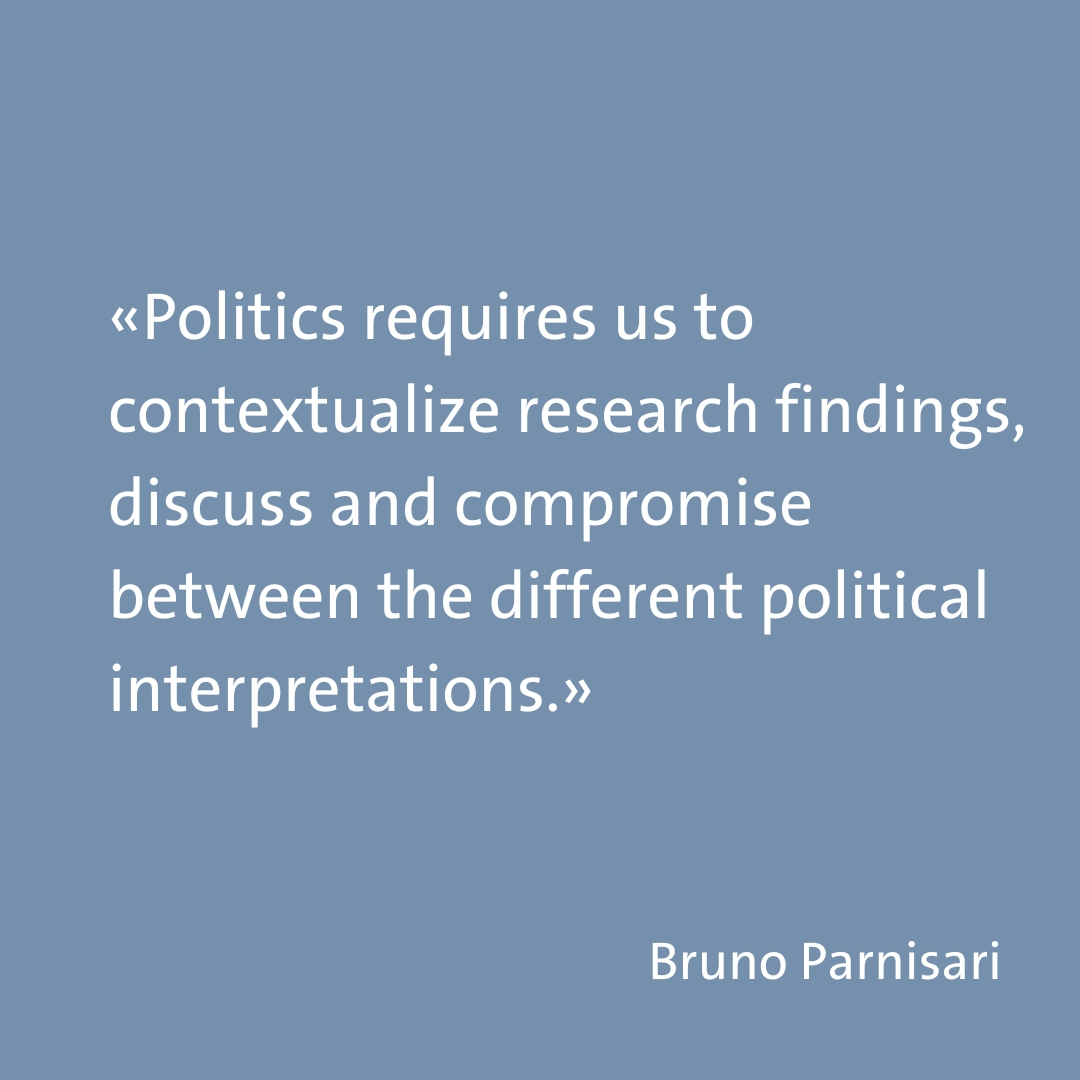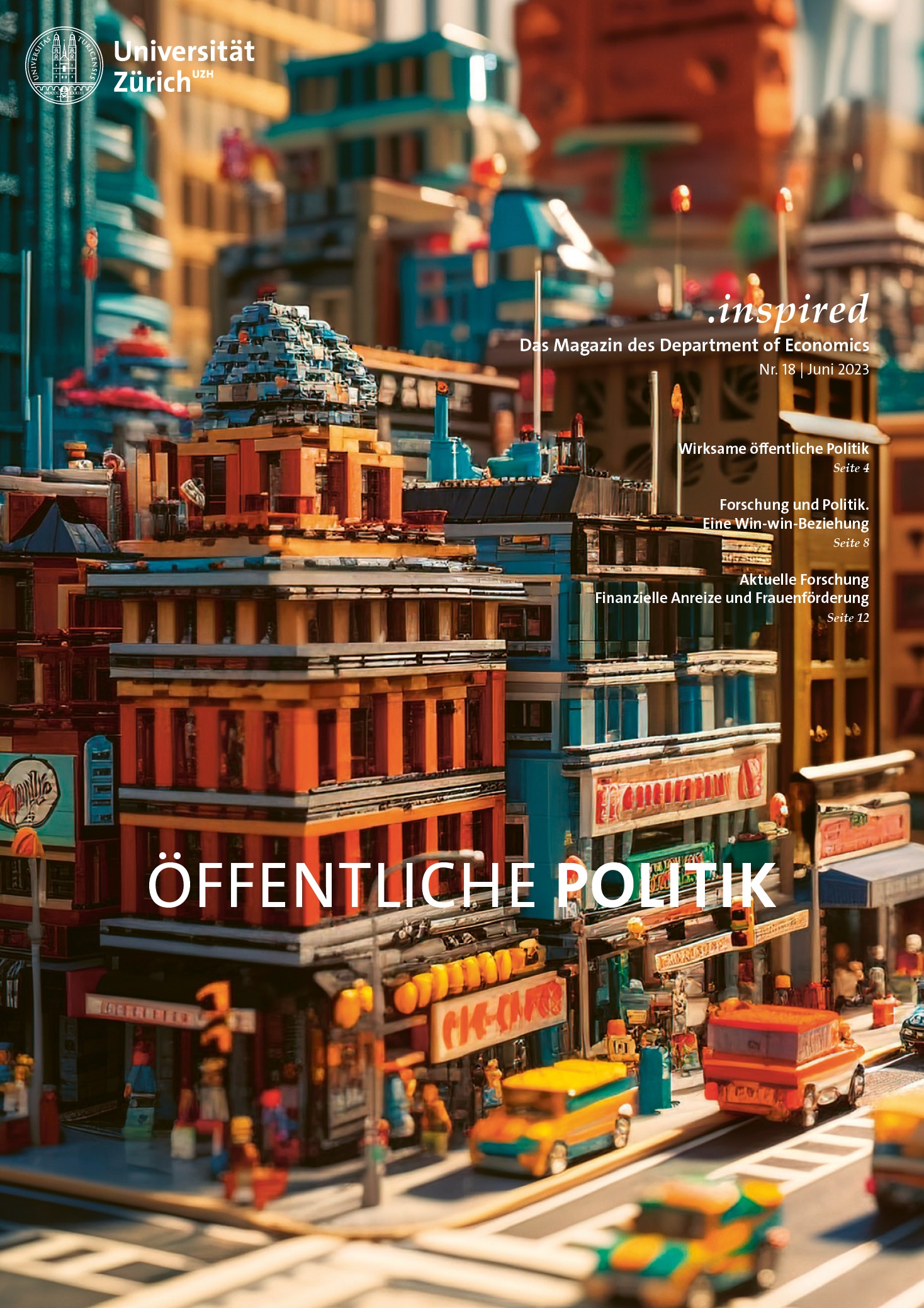Research and Politics. Win-win, actually.
Bern needs facts. To prepare political briefings, various federal authorities work closely with researchers. But only a small number of research tenders go to universities. Bruno Parnisari from the Federal Social Insurance Office and economics professor Josef Zweimüller discuss the reasons for this.
.jpg)

.inspired : Mr. Parnisari, how important is research for Swiss politics?
Bruno Parnisari : The findings from research projects are very important for political decision-making in our country. Parliamentary commissions in particular base their work on figures and analyses in order to understand challenges they face. To obtain the necessary information, my team and I extend research contracts to universities of applied sciences, universities, and private research providers.
.inspired : How significant are such commissioned research projects for you as an economics professor, Mr, Zweimüller?
Josef Zweimüller : As an academic, my primary task is academic research and scientists are qualified by whether they produce innovative and internationally visible research. But I also want to contribute to the societal discussion and offer my expertise. Research commissions provide exciting opportunities to do this and bridge the gap between science and politics.
.jpg)
Parnisari : Commissioned research is the link between science and politics. But this connection comes with its own challenges. Unlike science, politics takes place on a continuum between scientific facts and their political interpretation: Politics requires us to contextualize research findings, discuss and compromise between the different political interpretations. Science has no choice but to tolerate this way of dealing with its research results.
.inspired : Mr. Zweimüller, you mentioned that commissioned research offers exciting opportunities. Which ones exactly?
Zweimüller : We often hear that scientists are holed up in their ivory tower doing science for science's sake, while business, politics and society want to see interesting, relevant research results. In the past scientists often faced difficulties accessing data to conduct policy-relevant research. This has changed more recently. My experience is that you can overcome access hurdles via commissioned research. The dialogue with the experts from the FSIO also helps us to better understand the data and to gain access to data sources that have not been used so far. And often, we can request and are permitted to use the data of a commissioned research project for our own basic academic research. In this way, we can pursue our own, exciting follow-up projects which can advance academic research.
.jpg)
For example, we are currently working on a research project "Immigration and Social Insurance", for which we are evaluating linked register data from various social security funds. This is an important and politically charged topic and we hope to shed more light on the debate with our research and contribute to a more factual discussion of the immigration issue.
In a follow-up project, we want to examine the redistribution between the rich and the poor through social welfare systems. In this way, we want to investigate the welfare effects of the various social security and welfare systems. Through these kinds of projects we can push the research front and thus better fulfil our core business - to contribute to the international academic discussion…
Parnisari : ... and that in turn is interesting for us, because we can gain access to new calculation models and methods. As we also develop some models inhouse, we want to be sure that our internal approaches are up to date and reliable.

Zweimüller : Commissioned research also connects us to experts in administration and politics. This exchange with practitioners is key for scientists because it sensitizes us to upcoming socio-political issues and new, practice-relevant research ideas can arise from it. It helps us motivate and support our students to tackle questions that may not be relevant today but could become relevant for politics in the future.
Parnisari : We also must talk about communication. Many socio-political topics are inherently complex, and it is the responsibility of academia – and the government - to communicate very clearly and to contextualize. Good communication is key to making sure that research findings can enter the political discourse.
.inspired : Mr Parnisari, the FSIO research team coordinated around 30 research projects last year. What criteria are used to award these projects?
Parnisari : We work with various service providers when tendering our research projects and also regularly consider new providers - mostly private research institutes. Around half of the research contracts now go to this group. 40 per cent go to universities of applied sciences and 10 per cent to universities.

Zweimüller : Universities’ focus lies in basic research, and there are good reasons for this. In my opinion, we should not aim to increase the share of commissioned research as a goal in itself. Academics should produce internationally relevant research. This said, being connected with colleagues in non-academic fields and contributing to commissioned research projects can help us generate innovative research. Especially in applied empirical research there are many synergies that, in my opinion, have not been fully exploited.
Parnisari : We have had very good experiences with universities of applied sciences and private research institutes. Compared to universities, they take on a more practice-oriented viewpoint. The very concrete questions that politicians want to answer to with research tenders often correspond more closely to the specifications of these institutions. Scientists from universities or the ETH are more likely to be called in for expert hearings in parliamentary commissions. It is up to the universities whether they want increase their commissioned research.
Zweimüller : Many young researchers - for obvious reasons - keep their hands off commissioned projects because they have to publish papers. And that's a good thing. Commissioned research reports that are only intended for the client can be a stumbling block in the early stages of an academic career. This said, I see it as the duty of established researchers at universities - myself included - to invest time and resources in order to make better use of the potential of commissioned projects.

Senior Researchers can use their expertise to contribute to the current economic and socio-political discussion. As mentioned, contract research offers valuable contacts, know-how, access to data and new impulses that can ultimately be highly valuable for basic academic research - and from which students, from Bachelor level to PhD, can also benefit.
Parnisari : I agree. Working with people from different backgrounds expands one's own way of thinking. Scientists see how government institutions function; we learn how scientists work and approach a question. I am convinced that one need not fear losing scientific relevance when working on political issues. Science makes significant contributions to applied research, which in turn is relevant to politics.
Cooperation between science and government is a classic win-win situation. Without scientific input, politics as we practice it in Switzerland today cannot function.
